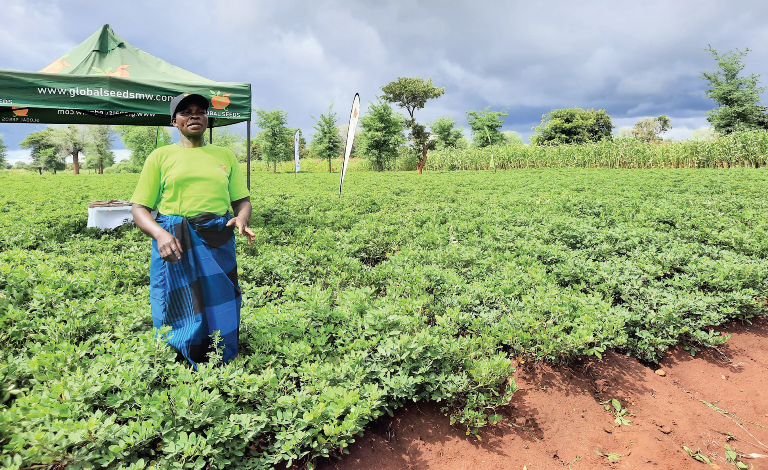Boosting yields and incomes
Mwatitha Bulayinati, aged about 40, grows groundnuts, maize, soyabeans and other crops for a living.
“Some of us have never stepped into a classroom, so I can’t write my name for you,” she says.

The mother of seven, from Mnkhuki Village, Traditional Authority Kalonga in Salima, exuded confidence when she shared her exploits at a farmer field day convened by Global Seeds Limited.
She does not grow tobacco and cotton because they require a lot of labour and capital though selling prices keep falling.
In 2019, Bulayinati met a friend affiliated to Chilimika Cooperative who spoke of high selling prices of groundnuts on the market.
The prices lured her to join the group of 57, which produces improved CG9 and CG11 groundnut seed on contract with Global Seed Limited..
This marked a turning point for Bulayinati and her family’s livelihood.
“In the past, we used to grow groundnuts too, but they were prone to disease attacks. Global Seeds gives us disease-free groundnuts seed varieties,” she explains.
Global Seeds trained the farmers how to plant groundnuts and care for them for high yields.
“In the past, we were not familiar with modern farming practices,” Bulayinati adds.
The seed company offers the groups with technical knowledge and extension services to multiply CG9 and CG11 seed varieties, which it buys from the farmers and sell as certified seed.
Bulayinati yields almost three tonnes of unshelled CG9 seed from her one-hectare field that once produced just a tonne.
“After being trained, I realised that one needs to plant certified seeds at the right time to avoid diseases and yield more,” she says, pointing at her visibly disease-free crop.
Last year, she sold her harvest at about K600 000, which she used to pay secondary school fees for her two children. She also bought five goats to cushion the family in times of economic shocks and land at Kaphatenga Trading Centre where the family constructed four houses that fetch about K80 000 a month.
“My husband is no longer worried now of where school fees and the next meal will come from,” she brags.
Chilimika Cooperative chairperson Manasseh Chijalo says members of the group have been on the rise since its inception in 2017.
“Our members have achieves notable successes such as buying livestock, land for building houses and farming,” he states.
During the field day on April 7, the two spoke of the life-changing benefits of implementing good farming technologies, including improved seed. The event, themed Promoting Rosette-tolerant Groundnut Varieties to Improve Productivity, attracted farmers, agricultural officials and partner institutions from Dowa, Nkhotakota and Salima.
Global Seeds, with support from the Foundation for a Smoke-Free World’s Agricultural Transformation Initiative through the Centre for Agricultural Transformation (CAT) project implemented by Land O’Lakes Venture37, is scaling up contract farming of rosette-resistant groundnuts varieties.
The partnership marks the first cohort of the CAT Business Incubation and Commercialisation portfolio, which is supporting 16 partners for it aims to enhance groundnut productivity and promote smallholder farmer livelihood diversification.
Currently, CAT is also supporting 13 partners on value addition for the 2022/2023 period.
CAT provides technical assistance to emerging agribusinesses like Global Seeds Limited, supporting them with trainings in access to finance, business management and agronomy for sustainable business growth.
Global Seeds managing director Shane Phiri says the company works with 700 farmers nationwide to promote rosette resistant varieties such as CG9 and CG11.
“I’m happy to say that in all the areas we have been working with farmers in the past two season, we are seeing increased numbers of farmers moving to new varieties and better agricultural practices,” he notes.
Phiri says most of these farmers are reaping at least two tonnes per hectare, superseding the national average yield of around 800 to 900kg.
“Most farmers are now acquiring additional land for farming. Essentially, what we are seeing is a farmer moving from subsistence to commercial farming,” he says.
CAT director of science, technology and innovation Geoffrey Kananji is delighted that farmers are adopting better technologies and embracing diversification with support from CAT’s smart farms.
“We are seeing better varieties and technologies that are being applied based on what we actually showcase at our smart farm. As our partner, Global Seeds Limited acts as a vehicle that takes technologies and reach out to these farmers. We are grateful to the Foundation for a Smoke-Free World for providing resources for the activities we undertake as CAT to support such farmers.”





